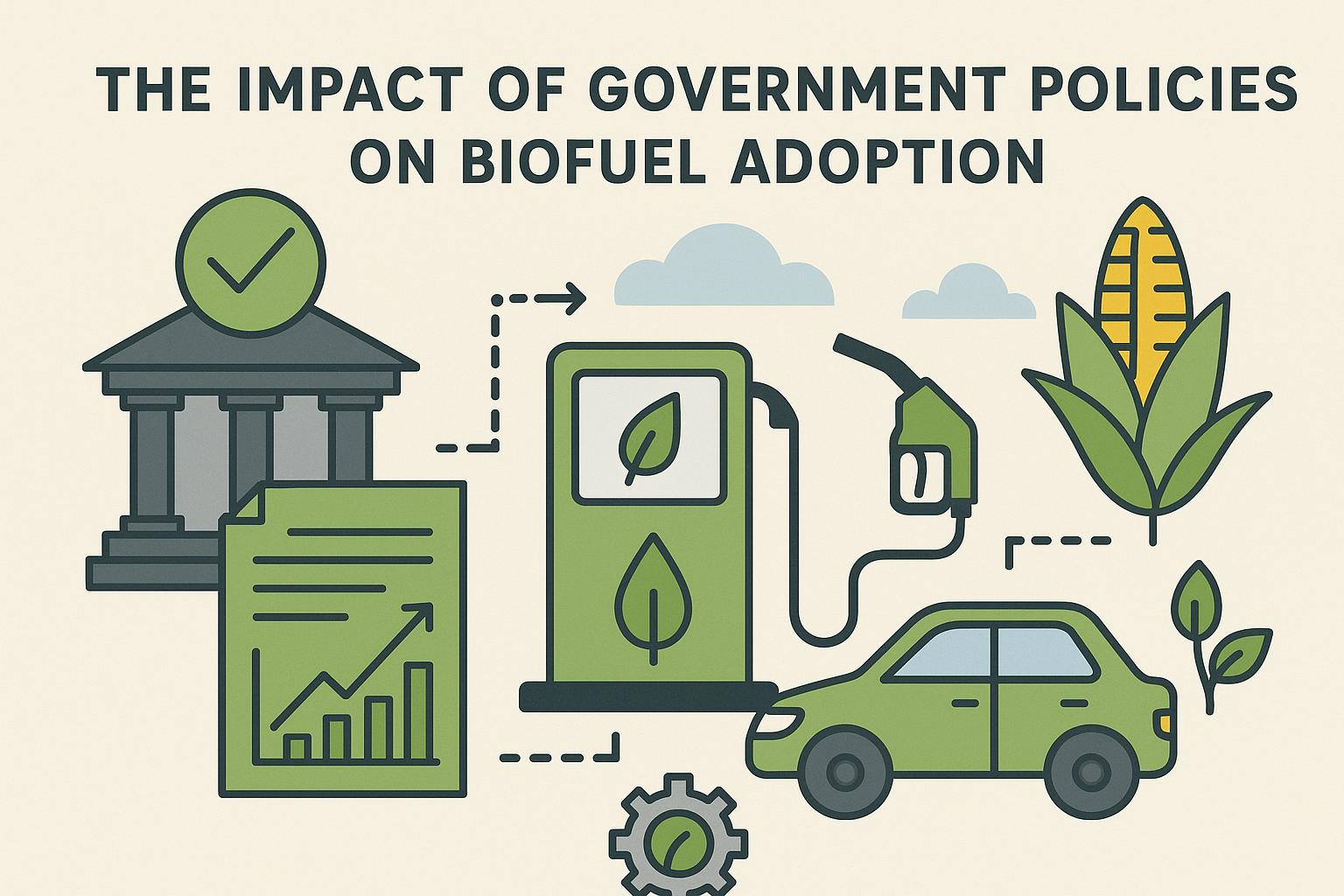Introduction
Government policies play a crucial role in the adoption and development of biofuels. Biofuels, derived from organic materials, present a sustainable alternative to fossil fuels, offering potential reductions in greenhouse gas emissions. However, their widespread adoption is contingent on supportive governmental frameworks.
Policy Frameworks and Incentives
Governments around the world implement various policy strategies to promote biofuel adoption. These include:
Mandates and Standards: The imposition of biofuel blending mandates is a common strategy. Such mandates require that a certain percentage of biofuel is mixed with traditional fuels. This ensures a minimum market share for biofuels, encouraging both producers and consumers to engage with this renewable energy source. Over time, such mandates have proven instrumental in fostering industry growth, driving technological advancements, and ensuring consistent demand within the market.
Subsidies and Tax Incentives: Financial incentives can significantly impact the adoption rates of biofuels. By subsidizing the production or purchase of biofuels, governments can make them more economically attractive compared to conventional fossil fuels. Importantly, these financial mechanisms serve to level the playing field, allowing nascent biofuel industries to compete with established fossil fuel counterparts. Furthermore, tax incentives can alleviate concerns regarding initial investments in biofuel technologies and infrastructure, providing a financial cushion that facilitates market entry and expansion.
Research and Development Support: Investment in R&D is essential for advancing biofuel technologies and reducing production costs. Government-funded research can accelerate innovation in biofuel production processes, making them more efficient and less resource-intensive. By prioritizing R&D, policymakers can address current technological constraints, paving the way for next-generation biofuel solutions that promise enhanced performance and reduced environmental impact.
Regional Variations in Policies
Different regions adopt distinct policy approaches to biofuels, influenced by their economic, environmental, and social contexts:
European Union: The EU has set ambitious targets for renewable energy, including biofuels. With the Renewable Energy Directive, the EU enforces stringent sustainability criteria for biofuels to minimize indirect land-use changes. This policy framework not only incentivizes green energy production but also aligns with the EU’s broader climate goals, demonstrating a comprehensive approach to sustainable development.
United States: The Renewable Fuel Standard (RFS) is a significant policy in the U.S., mandating the inclusion of renewable fuels in gasoline. This policy provides a structured pathway for biofuel integration into the energy mix, supporting both national energy security and environmental objectives. Additionally, state-level initiatives across the U.S. often complement federal efforts, exemplifying a multi-tiered approach to policy implementation.
Brazil: As a pioneer in ethanol production from sugarcane, Brazil’s government policies, like the Proálcool program, have historically been instrumental in scaling up biofuel production and consumption. By focusing on locally sourced feedstocks, Brazil’s strategy not only reduces foreign oil dependency but also capitalizes on the nation’s agricultural strengths, underscoring the importance of context-specific policy design.
Challenges and Criticisms
Despite favorable policies, biofuel adoption faces several challenges:
Environmental Concerns: The sustainability of biofuels is under scrutiny due to potential impacts on land use and food prices. Policies must address these concerns to ensure environmental compatibility. Unintended consequences, such as deforestation or biodiversity loss, require meticulous regulatory oversight and the adoption of more sustainable feedstock choices to prevent ecological degradation.
Economic Viability: The cost of biofuel production can be high, necessitating continued financial support from governments. Long-term sustainability of subsidies remains a topic of debate, pushing for the creation of self-sustaining markets. Economists and industry leaders alike call for innovative financial models and market mechanisms that reduce dependency on continuous government intervention.
Technological Constraints: Current technological limitations hinder the large-scale deployment of second and third-generation biofuels. Policies supporting technological advancements are vital for overcoming these barriers. Ensuring that research efforts are adequately funded and that innovation-friendly environments are fostered is crucial for the progress of biofuel technologies beyond their current limitations.
The Role of International Cooperation
International cooperation can significantly enhance the effectiveness of national policies on biofuel adoption. By engaging in global partnerships, countries can share best practices, harmonize standards, and collaborate on research initiatives. Encouraging examples include cooperation in joint research programs and international policy alignment through frameworks such as the Global Bioenergy Partnership. Collaborative endeavors not only facilitate knowledge exchange but also promote the development of universally accepted sustainability criteria, optimizing biofuel production and deployment globally.
Conclusion
Government policies are pivotal in facilitating the adoption of biofuels. While various strategies have proven effective, ongoing challenges necessitate a balanced approach that considers environmental, economic, and technological factors. To ensure the sustainability of biofuel markets, efforts must focus on creating robust policy environments, adaptable to changing circumstances and technological breakthroughs. With continued support and international collaboration, biofuels can play a significant role in the global transition towards sustainable energy. Policymakers, industry players, and researchers must work in unison to pave a future where biofuels effectively contribute to energy security, economic resilience, and environmental preservation.


